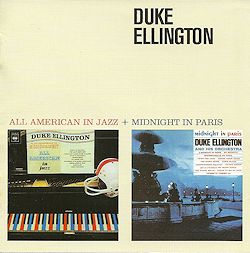1. Back To School
2. I’ve Just Seen Her (As Nobody Else Has Seen Her)
3. Which Way?
4. If I Were You
5. Once Upon A Time
6. Nightlife
7. Our Children
8. I Couldn’t Have Done It Alone
9. We Speak The Same Language
10. What A Country!
11. Under Paris Skies
12. I Wish You Love
13. Mademoiselle De Paris
14. Comme Çi, Comme Ça
15. Speak To Me Of Love
16. A Midnight In Paris
17. (All Of A Sudden) My Heart Sings
18. Guitar Amour
19. The Petite Waltz
20. Paris Blues
21. Javapachacha (Apache)
22. No Regrets
23. The River Seine
24. Paris Blues [Rare Vocal Version]
25. Guitar Amour [Solo Guitar Version]
Cat Anderson, Harold “Shorty” Baker - Trumpets (tracks 1-23)
Bill Berry - Trumpet (tracks 1-10, 12, 13, 15, 16, 17, 22, 23)
Ed Mullens - Trumpet (tracks 1-10)
Howard McGhee - Trumpet (tracks 11, 14, 19, 21)
Roy Burrowes - Trumpet (tracks 12, 13, 16, 17, 22, 23)
Ray Nance - Trumpet, violin (tracks 1-24)
Lawrence Brown - Trombone (tracks 1-24)
Chuck Connors - Trombone (tracks 12, 13, 16, 17, 22, 23)
Leon Cox - Trombone (tracks 1-11)
Buster Cooper - Trombone (tracks 12, 17, 22, 23)
Britt Woodman - Trombone (tracks 13, 16)
Johnny Hodges - Alto sax (tracks 1-24)
Russell Procope - Alto sax, clarinet (tracks 12, 13, 16, 17, 22, 23)
Jimmy Hamilton - Clarinet, tenor sax (tracks 1-23)
Paul Gonsalves - Tenor sax (tracks 1-24)
Harry Carney - Baritone sax, clarinet, bass clarinet (tracks 1-24)
Duke Ellington - Piano (tracks 2, 4, 5, 7, 8, 10-15, 17-23)
Billy Strayhorn - Piano (tracks 1, 3, 6, 9, 16, 24)
Aaron Bell - Bass (tracks 1-24)
Sam Woodyard - Drums (tracks 1-24)
Milt Grayson - Vocals (track 24)
Jimmy Gourley - Guitar (track 25)
I count myself as a devotee of Duke Ellington but I had never heard of either of these LPs, here reissued on one CD. They were both recorded in 1962 and
were the last LPs that Ellington cut for the Columbia company, with which the Duke had become disenchanted. Unlike the majority of Ellington's recordings,
both these LPs consist mainly of tunes by other composers.
All American in Jazz
(tracks 1 to 10) gives the Ellington/Strayhorn treatment to songs from the Broadway musical All American by Lee Adams & Charles Strouse. The
show couldn't have been a great success, as it only ran for 80 performances. The sole song from the score which rings a bell is Once Upon a Time:
it has a memorable hook that is repeated over and over again in the Ellington version, with plaintive trombone from Lawrence Brown.
Most of the songs are barely memorable and Ellington's arrangements fail to give most of them individuality. It is only the Duke's soloists who save them
from complete anonymity. Paul Gonsalves breathes life into I've Just Seen Her. Solos by Lawrence Brown and Jimmy Hamilton are the highlights of If I Were You.
The opening Back To School is a jaunty waltz but, like several of the tunes here, it has no significant melody. The tune of I Couldn't Have Done It Alone might have been the foundation for one of Rolf Harris's sentimental songs, and What A Country! is
remarkably similar to Morecambe & Wise's Bring Me Sunshine!
Midnight in Paris
(tracks 11 to 23) is another mysterious album. Ellington may have recorded it because he and Billy Strayhorn both loved Paris, or perhaps because they were
disappointed at the way that the film Paris Blues (for which they wrote the music) turned out not to have the radical plot they expected (although
I still think it was a good film and the Ducal music was excellent).
In fact this LP included two versions of the theme tune from Paris Blues - one instrumental, with gruff trombone from Lawrence Brown, the other
with a vocal by Jimmy Gourley. These tracks and Guitar Amour are the only compositions by Ellington; the rest are tunes associated with Paris.
Several of these seem ill-fitted for the Ducal treatment, although they are all orchestrated with the Ellington/Strayhorn touch. Some songs are so closely
associated with particular artists (for example, Edith Piaf with No Regrets) that it is difficult to put a new spin on them.
The most successful tracks are Billy Strayhorn's title-track (with a glowing sax section and Strayhorn at the piano); I Wish You Love (airy solos
from Jimmy Hamilton and Ray Nance); and Mademoiselle De Paris (a characteristic Ellington swinger with duelling trumpets and a gyrating solo from
Paul Gonsalves).
So I am afraid this album is largely a disappointment. Some critics would not be surprised, as they regard Ellington's 1960s work as less impressive than
most of his earlier recordings. Yet these 1962 recordings followed Paris Blues (which I think had a perfect soundtrack) and preceded the very
acceptable Afro-Bossa and The Symphonic Ellington - although the dubious Mary Poppins dates from the same period. One has to
conclude that Duke's career was a roller-coaster of ups and downs, although with many more ups than downs. And we have to remember that even second-class
recordings like these 1962 examples might be considered first-rate if they came from any other band.
Tony Augarde
www.augardebooks.co.uk
